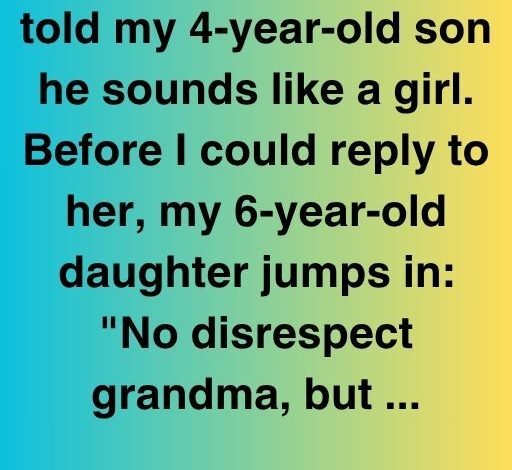“No Disrespect Grandma, But Let Him Be”

The air in the dining room grew thick with silence. My mother-in-law had just told my four-year-old son, Eli, that his voice “sounds like a girl.” Before I could even think of a response, my six-year-old daughter, Mira, spoke up. Her voice was steady and clear as she looked her grandmother straight in the eye.
ADVERTISEMENT
“‘No disrespect grandma, but boys can sound however they want.'”
ADVERTISEMENT
The words hung in the air. We were all gathered for Sunday lunch, and the unexpected comment from a child had stopped everything. Eli, who had been happily chattering moments before, was now quiet, pushing his food around on his plate. My mother-in-law seemed taken aback, clearly not expecting to be corrected by a young child. She attempted to laugh it off, saying she only meant that Eli had a “sweet little voice.”
ADVERTISEMENT
But Mira wasn’t finished. “‘Sweet is not just for girls,'” she stated firmly.
I had to suppress a smile. My daughter had always had a strong sense of fairness and a powerful desire to stand up for what she believed was right. My husband, however, shifted uncomfortably in his chair, hoping to avoid any conflict with his mom. I tried to ease the tension, adding softly that it was important for children to be able to express themselves and “feel free to just be themselves.” My mother-in-law nodded, but her pursed lips showed she wasn’t convinced.
The rest of the meal was unusually quiet, filled only with the gentle clinking of silverware and Mira’s quiet whispers to Eli about dinosaurs.
That night, after the kids were in bed, my husband and I talked. He told me that his mom didn’t mean to cause any harm, but I explained that’s where the problem lies. Eli was sensitive, and I was worried that he might start to believe there was something wrong with the sound of his voice, the things he enjoyed, or even the clothes he wore. My husband took a moment to consider my words, then admitted I was right. He said he would need to talk to his mom. While I was glad he agreed, I also knew that for her, change would be a slow and difficult process. She was from “a different time,” as the saying goes, but that didn’t lessen the impact of her words on a small child.
In the days that followed, a noticeable change came over Eli. He became quieter. The funny character voices he used to love and the silly songs he would sing while I was cooking were gone. He was no longer the noisy, happy presence in the house. Even Mira noticed, whispering to me one night, “‘He doesn’t do his voices anymore. I think Grandma hurt his feelings.'” My heart ached for him. One single comment had deeply affected my little boy.
The next morning, I sat with Eli and told him how much I missed his lion voice. He looked at me with sad eyes and said, “‘But Grandma said I sound like a girl.'” I held him close and assured him that she was wrong. “‘You sound like you. And that’s perfect,'” I told him. He didn’t say anything, but he leaned into my hug.
That evening, I knew I had to act. I couldn’t allow a careless sentence to damage my son’s self-esteem. I called my mother-in-law and, after a few pleasantries, told her what had happened. She was surprised and regretful, saying she didn’t realize how much her words had affected him. I explained that at four years old, everything an adult says goes deep. I told her I knew she loved him, but that her words had made him feel ashamed. I gently asked her to talk to him, to let him know he was loved and perfect just as he was. She agreed to come over the next day.
She arrived with cookies and a gentle smile. She knelt down to Eli’s level and apologized, telling him his voice was “wonderful” and that he was “just perfect the way you are.” Eli, who had been shy at first, finally smiled. It was a small moment, not a big dramatic one, but it was important. The next day, Eli was back to his happy self, doing his animal voices with renewed joy. It felt like a win, but I knew our journey wasn’t over.
A few weeks later, Mira came home upset from school. Some children had told Eli he couldn’t wear his sparkly pink sneakers. My husband suggested we have Eli pick out different shoes to make things “easier,” but I knew that wasn’t the right answer. We would be teaching him to hide who he was for the approval of others. I insisted that he had the right to wear the shoes he loved, and that we would support him. My husband eventually agreed.
The next morning, Eli proudly wore his pink sneakers to school. I waited nearby, filled with a familiar mix of fear and hope. At lunchtime, I saw a group of boys point and laugh at Eli’s shoes. My heart sank. But then, one of the boys walked over to Eli. They talked, and then, to my surprise, they started running around the playground together. It turned out the other boy had light-up sneakers too, just blue ones. When I picked Eli up, he was beaming. He told me his new friend, Josh, thought his shoes were “cool.” Sometimes, a single kind voice is all it takes to make a world of difference.
As the weeks went on, the small moments of bravery began to build. Other kids started wearing different colors. The school read a book about celebrating differences. And then came the spring talent show. When Eli announced he wanted to perform his animal voices on stage, my first feeling was fear. But we supported him. My husband practiced clapping, and Mira helped him with his animal choices.
On the night of the show, Eli stood on the stage in his animal mask and sparkly pink shoes. He performed his animal voices and a funny chicken dance that had the whole audience laughing. I saw my mother-in-law stand and wipe away a tear. When he came off stage, he ran into my arms, asking if he did a good job. I told him he was amazing, and that he had inspired other children. As we walked to the car, my husband said he was glad we hadn’t made Eli change his shoes. Mira, ever observant, said, “‘People just need time to learn.'”
She was right. The world can be slow to accept people who are different, but that doesn’t mean we should stop being ourselves while it catches up. There will always be people who say thoughtless things. But there will also be people like Mira, like Eli’s new friend Josh, who stand up and say, “Let him be.” Those voices are the ones that matter most.
The lesson here is simple: teach your children to be kind, but also teach them to be brave. Encourage them to be proud of who they are, even if the world isn’t ready to applaud. Because one day, it will, and it will be because of the brave voices that never gave up.




